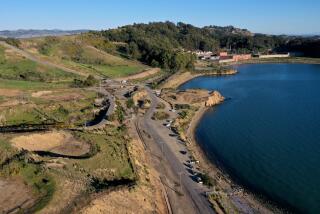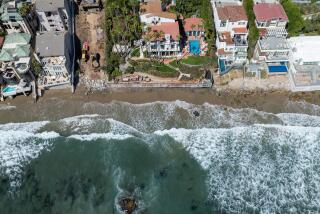Op-Ed: California’s beaches belong to the public — not to the one percent
- Share via
The small cove in San Mateo County known as Martins Beach, just south of Half Moon Bay, was used regularly by the public for at least a century – until 2010, when the Silicon Valley billionaire and co-founder of Sun Microsystems Vinod Khosla locked a gate on the only road that provides public access to it.
Khosla had bought 89 acres of coastal property surrounding Martins Beach two years before. He had been warned by San Mateo County and the California Coastal Commission – before and after buying the property – that he would be required to keep the public access open. Public access to Martins Beach, and to all land seaward of the mean high tide line in California, is guaranteed in the state’s constitution and mandated within the Coastal Act of 1976. Khosla closed it anyway, and he has kept it closed despite personal pleas and a legal order to reopen it.
My organization, the Surfrider Foundation, sued Khosla for failing to apply for a development permit that is required in order to change public access to the coastline. We won our case nearly three years ago. A San Mateo County judge ordered Khosla to restore the access to Martins Beach and to seek the necessary permit. Khosla appealed the ruling, arguing that he has a fundamental right to exclude the public from his private property without state interference. Though Khosla doesn’t actually live at Martins Beach, he has stated in interviews that he views the battle over access as a matter of “principle.” On June 15, Surfrider defended our victory in court. A decision is expected within 90 days.
Battles over public access to the beach have increased along with our state’s population and singular concentrations of wealth.
The fate of Martins Beach holds great significance for Californians. Although they are not new, battles over public access to the beach have increased along with our state’s population and singular concentrations of wealth. In December, the Coastal Commission levied more than $4 million in fines against a Beverly Hills plastic surgeon who for nine years had barricaded a public access point to Las Flores Beach in Malibu with a private fence and gate. Similar battles were waged over access to Carbon Beach in Malibu with music mogul David Geffen and others. In Orange County, the developer behind a multimillion-dollar gated community tried for years to keep the public from Strand Beach, triggering an extensive — and expensive — legal battle.
If California is unable to wrest public access back from Khosla, it could set a very worrisome precedent in favor of the wealthy private citizens who would prefer to disregard the Coastal Act, California’s 40-year-old promise that public access to the state’s beaches is a universal right.
The case of Martins Beach is testing the public’s power to enforce the Coastal Act in unprecedented ways. Because Khosla refuses to unlock the gate and reopen the public access, last year, for the first time in its 78-year history, California’s State Lands Commission directed its staff to explore the possibility of invoking eminent domain to obtain 6.4 acres of Khosla’s estate — the land that sits under the road that was historically used to get to Martins Beach and an adjacent parking area. The agency took this extraordinary step after a year of attempting good-faith negotiations with Khosla and receiving outlandish demands in return. Khosla suggested the state pay $30 million for the 6.4 acres when, according to the commission’s appraisals, that portion of land is worth $360,000. He also filed lawsuits against members of the State Lands Commission, the Coastal Commission, and the staff of San Mateo County.
If the Lands Commission goes the eminent-domain route, it’s unclear how the state will pay for it, since California’s budget does not allocate funds for buying public beach access back from private citizens. State Sen. Jerry Hill (D-San Mateo) has introduced legislation that would allow the Lands Commission to create a “subaccount” for the acquisition of the land, to which the public and other agencies could donate. The bill has moved through the state Senate and is currently in the Assembly, where it is scheduled to be heard by the Judiciary Committee on July 11. The county of San Mateo is considering a contribution of $1 million to the fund, if it is approved.
In the meantime, the gate at Martins Beach has remained closed, except on rare days when it is opened at the whim of Khosla’s property manager. Private security guards monitor the area and “No Trespassing” signs are posted nearby.
But as Khosla will ultimately learn, Californians will not easily cede their right to the shoreline. Residents continue to use Martins Beach, parking alongside Highway 1 and then walking a steep, lengthy path down to the cove. Many more have attended meetings held by the Coastal Commission and State Lands Commission.
At Surfrider, letters from concerned citizens pile up. Last year, Marilyn Barcellos of Campbell, Calif., asked our organization to carry a message to the Coastal Commission. “Martins Beach is the only beach our families have been going to for over 120 years,” Barcellos wrote. “I’m 69 now and I’ve been going there since we were tiny kids, until the gate got locked by some rich guy. So unkind.”
It is unkind. It’s also illegal.
Chad Nelsen is the CEO of the Surfrider Foundation.
Follow the Opinion section on Twitter @latimesopinion or Facebook
ALSO
California may be leading on climate change, but that doesn’t mean it can ignore local pollution
LAPD’s cadet scandal may sound like a bad ‘Police Academy’ sequel, but it isn’t funny
Trump’s aggressive immigration enforcement is overwhelming an already taxed court system
More to Read
A cure for the common opinion
Get thought-provoking perspectives with our weekly newsletter.
You may occasionally receive promotional content from the Los Angeles Times.










